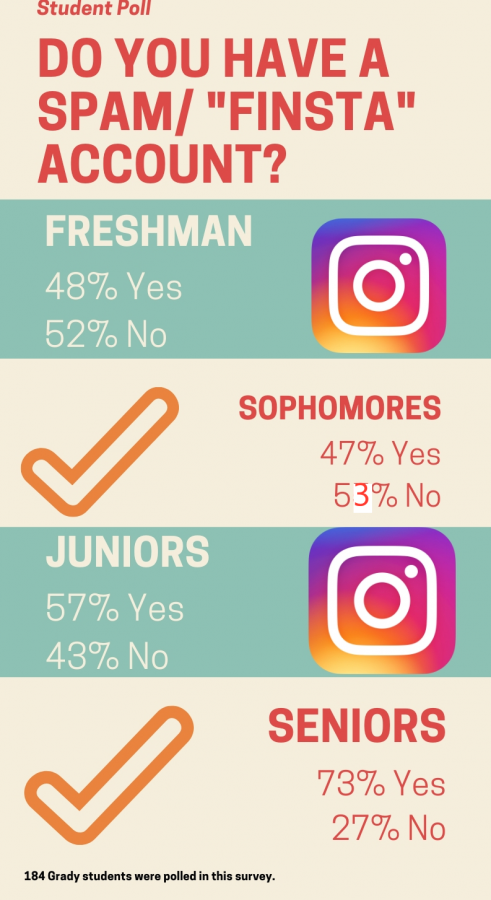Spam Instagram accounts affect students’ futures
The senior class reported having the most students with spam Instagram accounts. In contrast, sophomores had the least amount of students with an account.
January 9, 2019
Scrolling through my Instagram feed, I see the usual: girls rigidly posing for selfies in the mirror, group pictures of teens clutching red Solo Cups at parties, and long, emotional captions complaining about the trials and successes of being a modern-day high school student.
Instagram has become a platform where teenagers use spam accounts or “finstas” to post whatever they feel, whenever they feel. This is becoming a problem.
Our generation has begun to neglect the fact that what is posted on social media can never simply be deleted. I feel as though some of my classmates need to be refreshed on this very concept.
I have fallen prey to the notion that “What happens on the Internet stays on the Internet.” I have noticed lately, especially as my classmates age and experiment with new things, that they document every experience they have on their spam accounts.
Spam accounts are private Instagram accounts usually intended to cater to a small audience of close friends. Most of these Instagram accounts have 70-150 followers of “close friends.” That, in itself, is ironic —150 close friends?
I don’t think most of us have that many besties who want to see detailed narratives about the amount of homework that you have or the bomb selfies you took over the weekend. Believe me, I do discuss these topics, among many others, with my friends when we get together face to face. But that is the key: face to face.
Expressing emotions over a screen can be very dangerous because every piece of information that we post, comment or plaster on our Instagram feeds is automatically sent to databases where it is stored. We need to be more mindful that what we say on our spam accounts have lasting effects.
My friend pointed out to me the other day that we will be one of the first generations that will raise children who will be able to do a quick Internet search and find that their mother was quite the partier in high school.
Now, more than ever, because we were raised with social media having significant social (and now political) impact on our day to day lives, we need to be mindful of the effects these platforms will have on our future.
One thoughtless post from our junior year of high school could prevent us from getting into our dream school, or even worse, from landing a job in the future. There are some instances where students have scholarships revoked or have been kicked out of universities over comments made over social media, on platforms that were supposed to be “private.”
During the 2018 school year, a college student and sorority sister was expelled from the University of Alabama after she posted a video of her saying racial slurs and profanities to her spam Instagram account. In a separate instance, in January of 2018, a player was suspended from the Georgia State women’s soccer team after a screenshot of an inappropriate post on her spam account involving a racial slur surfaced. She later withdrew from the school.
So maybe this is a reminder, a warning, or for some a wakeup call, that using spam accounts to express emotions, vent or brag about your latest achievements can be a risk. At the time, you might not feel as though your comments have any weight, but what you do or say on social media can never be erased.







